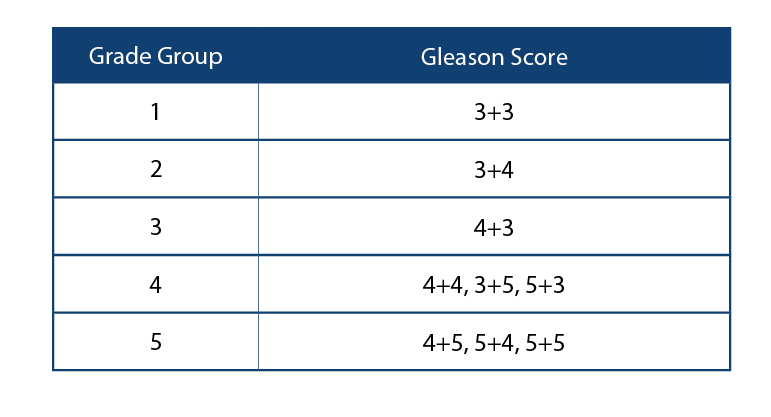PROSTATE CANCER
Prostate cancer is a very common male cancer. It has a lifetime risk diagnosis of 17% and risk of death in 3-4%. Age, family history and race (African american) are important risk factors in prostate cancer development. There is a 2 fold increase risk of prostate cancer if a first-line relative has prostate cancer. There is a 6-9 fold increase risk of prostate cancer if two or more first-line relatives are diagnosed with prostate cancer.
Prostate cancer diagnosed on biopsy is graded via the Gleason Score, which looks at the cellular architecture or ‘pattern’ of prostate cancer. The more disorganized the pattern, the higher the Gleason Score and hence for more aggressive the cancer is. The Gleason score comprises 2 scores. The first score is the most prominent pattern and the second score is the second most common pattern present.
The Gleason Score has been recently further categorized into Grade Groupings, which simplifies the understanding.The Grade Groupings are from 1 – 5, which comprises of the Gleason Score.The higher the Grade Group the more aggressive the cancer.
GRADE GROUPING

Low Risk Prostate Cancer
- GG 1
Intermediate Risk Prostate Cancer
- GG 2
- GG 3 (Unfavorable)
High Risk Prostate Cancer
- GG4
- GG5
Dr Paffen follows EAU and AUA guidelines on prostate cancer treatment.
Patients with low risk prostate cancer or very low volume intermediate risk prostate cancer will be recommended active surveillance to avoid over-treatment with surgery or radiotherapy for potentially insignificant disease.
Patients with intermediate/high risk prostate cancer will be will be recommended active treatment in the form of either surgery or radiotherapy depending upon the prostate size, patient preference and medical/surgical history. Dr Paffen will always advise a consultation with radiation oncologist in order to be fully informed.
- Dr Paffen offers Barigel, rectal spacer for patients choosing radiotherapy
Patients with a life expectancy of <10 years will be counselled regarding the utility of avoiding a prostate biopsy as it is likely they will die of other causes than prostate cancer.

